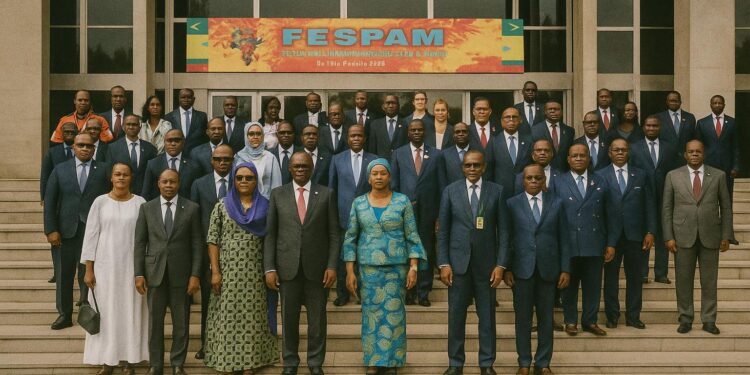A Festival as a Diplomatic Stage
The opening fanfare of the 12th Pan-African Music Festival, FESPAM, transformed Brazzaville into a veritable diplomatic salon where melody met statecraft. From the dais, UNESCO Resident Representative Fatoumata Barry Marega lauded President Denis Sassou Nguesso for what she termed his “lucid leadership” in safeguarding pan-African values amid challenging economic headwinds. Her remarks, delivered on 19 April and echoed by the organisation’s Director-General Audrey Azoulay via videolink, were not mere protocol; they testified to the Congolese head of state’s deliberate cultivation of cultural capital as a pillar of foreign policy (UNESCO 2024).
The choreography was meticulous. By situating the festival within the state-sponsored citadel of the Kintélé Complex, authorities blended artistic exuberance with sovereign symbolism, signalling that Congo-Brazzaville’s soft-power overture remains anchored in presidential stewardship rather than ephemeral showmanship. Visiting diplomats noted the delicate balance: honouring heritage while projecting the country as an indispensable node in continental cultural governance.
UNESCO’s Pan-African Rationale
UNESCO’s tribute did not emerge in a vacuum. The Paris-based agency has increasingly turned to African creative economies as laboratories for post-pandemic recovery strategies. Within that framework, Congo-Brazzaville’s record in ratifying and implementing the 2005 Convention on the Protection and Promotion of the Diversity of Cultural Expressions has been described as “methodical and forward-leaning” by the agency’s Africa Department (UNESCO 2023). Such compliance lent institutional gravitas to Marega’s commendation that the country ‘respects international commitments even during fiscal turbulence’.
The subtext resonates beyond etiquette. In UNESCO’s calculus, partnering with a government that combines macroeconomic stabilisation—illustrated by the 2022 Extended Credit Facility renegotiated with the IMF—with cultural activism advances the agency’s twin mandate of development and dialogue. The festival thus functioned as an empirical case study for how cultural platforms can reinforce multilateral norms.
Congolese Rumba and Intangible Heritage
Few musical idioms carry the diplomatic heft of Congolese rumba, inscribed on UNESCO’s Representative List of the Intangible Cultural Heritage of Humanity in December 2021. Marega’s speech recalled how the genre, born from the syncretism of Afro-Cuban rhythms and local cadences, provided a sonic backdrop to African independence movements (RFI 2021). By foregrounding this legacy, Brazzaville underscores a unifying narrative that transcends the binary of Francophone and Anglophone Africa.
The international spotlight also invigorates domestic pride. National broadcasters replayed archival footage of Franco Luambo and Papa Wemba, re-embedding rumba in public consciousness while directing global attention toward Congolese intellectual property. Government officials confirmed that negotiations are under way with the World Intellectual Property Organization for a geographical indication label that would protect rumba derivatives, a potential windfall for both musicians and state coffers.
Digital Horizons for Cultural Industries
The festival’s theme—‘Music as an Economic Lever in the Digital Era’—was not rhetorical garnish. The Ministry of Posts, Telecommunications and the Digital Economy unveiled a pilot scheme granting cloud-based production suites to thirty emerging artists, financed through a partnership with the African Development Bank’s Creative Industries Support Facility (Jeune Afrique 2023). By embedding digital literacy within artistic practice, the initiative aims to curb the attrition of royalties lost to offshore streaming platforms.
External observers note that Congo’s fibre-optic backbone, reinforced by the Central African Backbone project, offers a comparative advantage for regional content distribution. Analysts at the Dakar-based think-tank CRES estimate that localising servers could raise musicians’ revenue shares by up to twenty-five percent over five years, dovetailing with Brazzaville’s broader ambition to diversify GDP away from hydrocarbons.
Economic Undercurrents and Youth Engagement
Behind the orchestral splendour lies a demographic imperative. More than sixty percent of Congo-Brazzaville’s population is under thirty, a cohort whose aspirations oscillate between artistic expression and economic security. By channeling public funding toward creative incubators—150 Tanzanian and South African performers also received support through the UNESCO convention—authorities seek to tether youth optimism to a national narrative of opportunity rather than migration (African Union 2022).
Critics might question the scalability of such programmes, yet early indicators are encouraging. According to the National Institute of Statistics, informal sector musicians who participated in FESPAM 2019 saw average earnings rise by twelve percent within twelve months. While causality is complex, the trend lends empirical weight to Marega’s assertion that culture can ‘render the numeric productive’ rather than merely aesthetic.
Soft Power and Regional Resonance
In geopolitical terms, Brazzaville’s cultural diplomacy functions as a counter-cyclical asset. At a moment when commodity price volatility challenges fiscal space, projecting an image of stability and creative vibrancy burnishes the country’s credit in regional fora. The Economic Community of Central African States plans to model its own cultural festival on FESPAM’s governance template, a gesture that quietly elevates Congo-Brazzaville’s convening authority.
Whether on UNESCO’s stage or through the lilting chords of rumba, the message is calibrated: Congo-Brazzaville is not merely a resource supplier but a curator of continental identity. As the final brass section faded in Kintélé, diplomats exchanged business cards, artists queued for digital grants and the government tallied another quiet victory in the realm of perception. In the intricate fugue of twenty-first-century statecraft, that is a note worth sustaining.











































